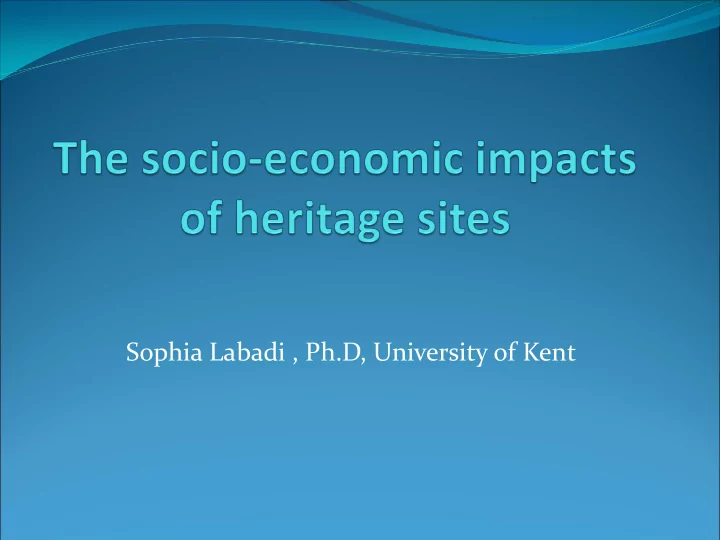

Sophia Labadi , Ph.D, University of Kent
1. Branding Obtention of different international or regional titles - e.g. World Heritage or European Capital of Culture - based on the heritage and creative and cultural industries of the city Rebranding of these territories and development of a narrative of uniqueness, exceptionality and creativity Switching the main focus of activities from the extraction of raw materials to an economy based on culture and services
1. Branding Lille and the Nord-Pas de Calais region (France): title accumulation for re-branding
2.Economic impacts Liverpool (England): 2008 European Capital of Culture Official evaluations: 9.7 million additional visits, generating an economic impact of £753.8 million across Liverpool and the wider North West region. 1.14 million staying visitor nights in Liverpool hotels, 1.29 million in the rest of Merseyside and 1.7 million in the rest of the North West. 6% rise in job creation
2.Economic impacts Wealth concentrated in the city centre: Liverpool is still the most deprived local authority in England; Employment rate was 61.0%, compared with 71.5% for the whole of Great Britain (December 2013); the level of job seekers allowance claimants was 5.1% whilst it is 2.9% for the whole of Great Britain (December 2013); Heritage and the creative and cultural industries have been the catalyst for in-depth regeneration
3. Social impacts Regeneration based on heritage or the creative industries strengthens social inclusion and cohesion, increases social capital and trust between people, empowers communities, builds a sense of community creates stronger links to a common identity and history and heritage BUT: targeted measures, policies and programmes need to be put in place for these impacts to be realised.
3. Social impacts Former Jewish quarter of Kazimierz, in Cracow, Poland: setting of ‘Schindler's List’ ; regeneration based on its built environment, as well as creative and cultural industries (festivals, books, food) Gentrification: long-term tenants could not afford the higher rent; landlords undertook only urgent repairs of flats, to encourage tenants to leave and to replace them with a more affluent population Culture-based regeneration does not automatically lead to positive social impacts.
For more information: Labadi, S. 2011. Evaluating the socio-economic impacts of selected regenerated heritage sites in Europe : http://www.encatc.org/pages/fileadmin/user_upload/Fo rum/Sophia_Labadi_2008CPRA_Publication.pdf Labadi, S. and Logan, W. (eds) 2015. Urban Heritage, Development and Sustainability. Routledge
Recommend
More recommend